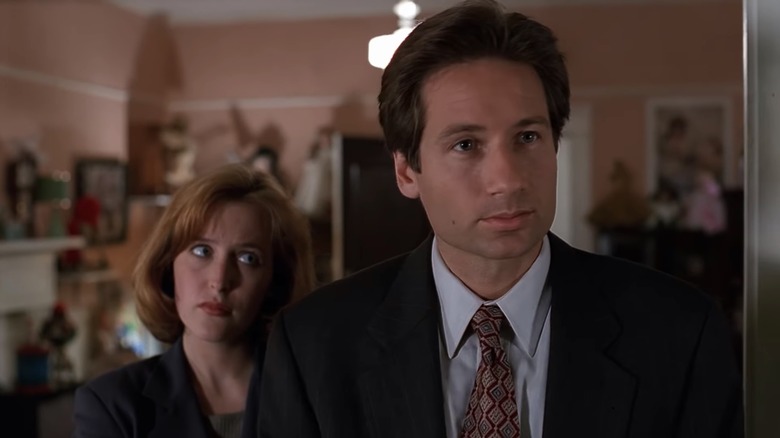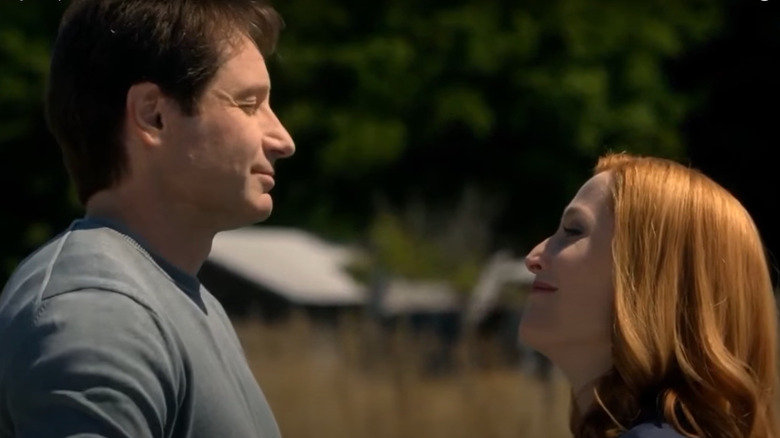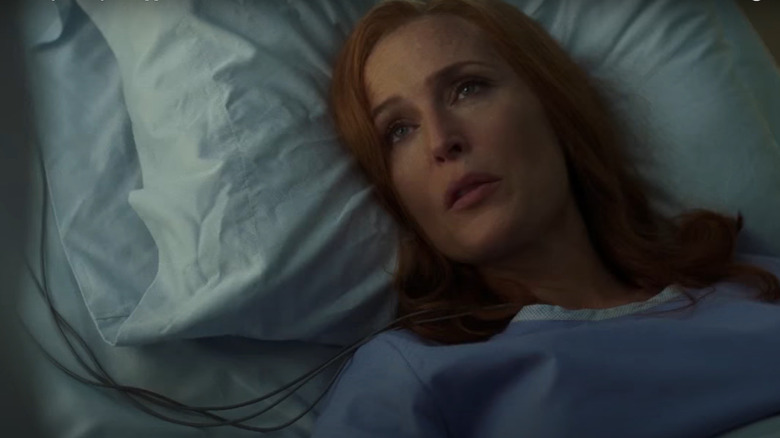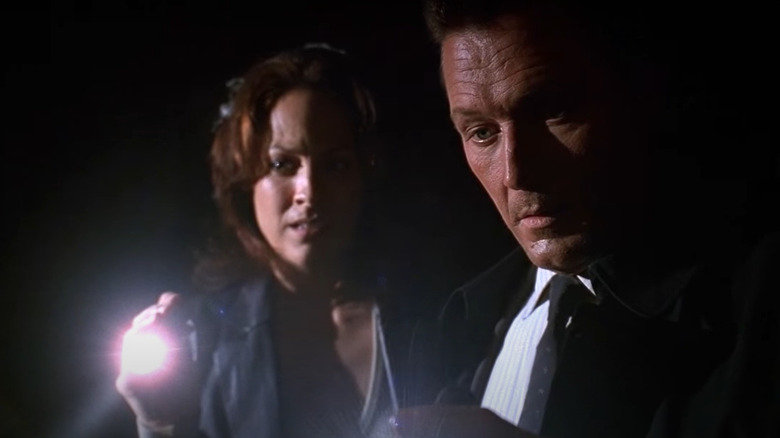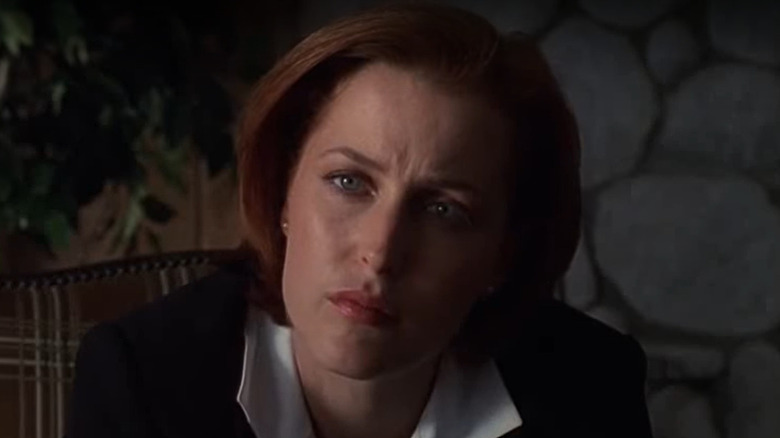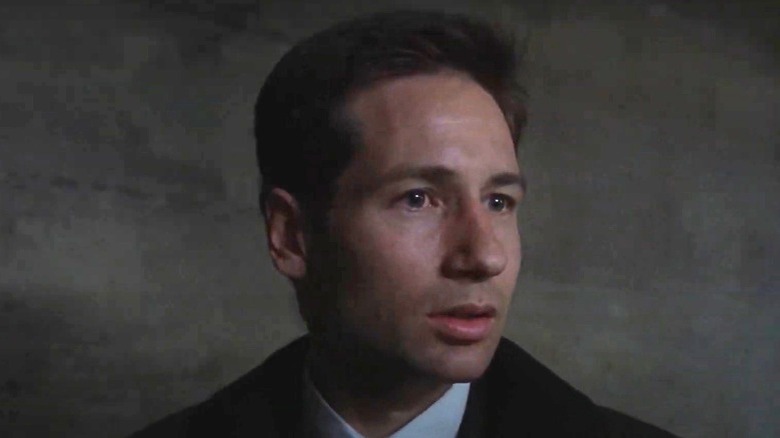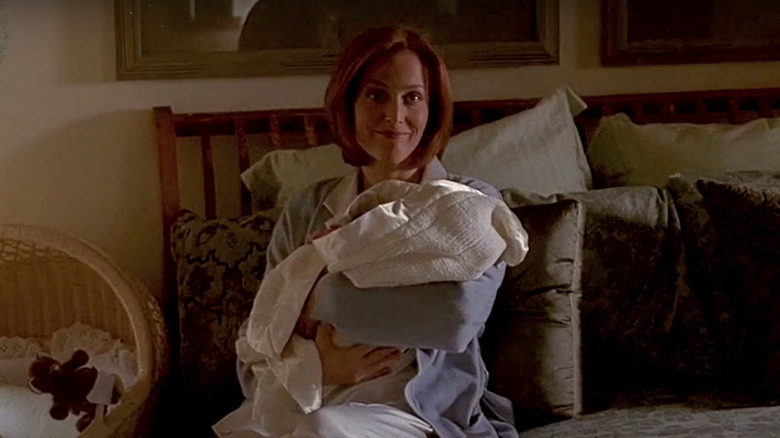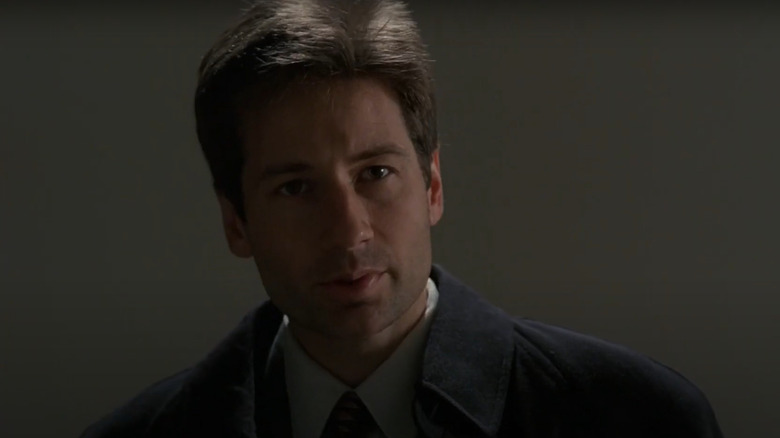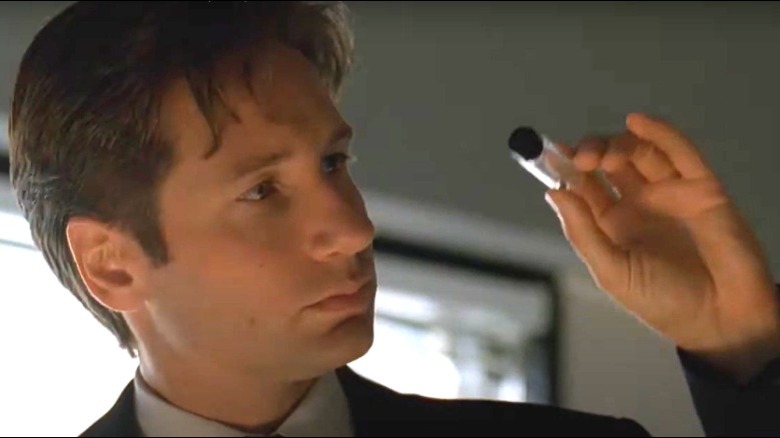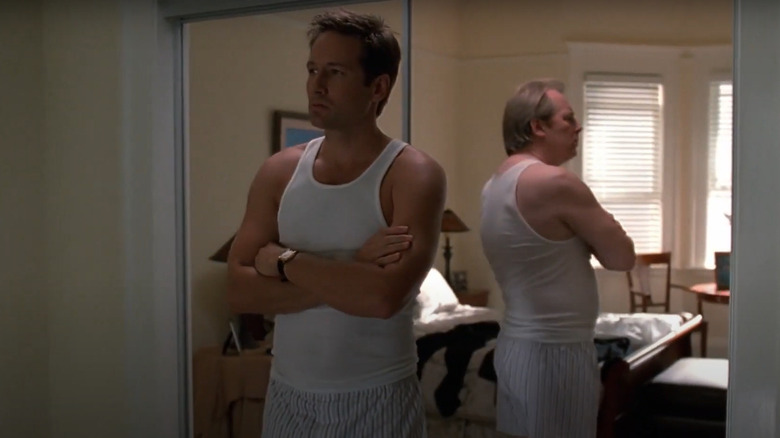Every Season Of The X-Files Ranked
"The X-Files" is one of the most cherished shows in television history and has built up a devoted and massive fanbase that has been around ever since the series hit the small screen in 1993. Following the adventures of FBI agents Fox Mulder and Dana Scully, the show gradually established a sprawling mythos that incorporated extraterrestrial life, government cover-ups, and the supernatural, delivering unexpected twists and turns week after week over the course of 11 seasons. But "The X-Files" was less of a typical sci-fi show and more of a pop-culture force, paving the way for other similarly styled series like "Lost," "Supernatural," "Bones," and even the "Final Destination" franchise. David Duchovny and Gillian Anderson even reprised their roles as Mulder and Scully for the classic "Simpsons" episode, "The Springfield Files," which, if we're being honest, is a true sign of the legitimacy of "The X-Files."
However, like even the greatest of TV shows, "The X-Files" had its ups and downs, with its best seasons sometimes undermined by lesser seasons. Nevertheless, that trend is inevitable for any series that lasts more than a few seasons. Changing casts, format experimentation, and new writers are bound to lead to varying quality. Let's take a look at every season of "The X-Files" from worst to best.
11. Season 10
Following a 14-year absence since the series ended in 2002, the return of "The X-Files" proved to be a major disappointment. Its short duration didn't help. It's hard to get the audience invested with only six episodes. However, there were some bright spots during this season, with the best episode being "Mulder and Scully Meet the Were-Monster." In it, Mulder and Scully take on a case involving a supposed humanoid lizard that is blamed for a brutal murder near Shawan, Oregon. The episode was a welcome return to the classic style and format that made "The X-Files" of the past such great sci-fi television. It was also packed with references to the previous era of the show, giving longtime fans an additional treat. While not as good as "Mulder and Scully Meet the Were-Monster,"
"Founder's Mutation" is a relatively strong and chilling episode for an otherwise lackluster season. Here, Mulder and Scully investigate a research institute that's performing bizarre experiments on children.
That's about it for the more watchable episodes of Season 10. Quite possibly the worst episode of the season is "Babylon," which deals with Islamic suicide bombers. With a by-the-numbers plot, the subject matter could've been handled much better but instead comes off as tasteless and insensitive. "My Struggle II" was another miss for the show's return. Mulder and Scully contend with a virus that may have alien origins and now threatens the world's population. It's an interesting premise, but it's far too rushed and filled with bad logic to take seriously.
10. Season 11
Season 11 of "The X-Files" was a noticeable improvement, possibly because its longer run (10 episodes instead of Season 10's six) allowed for better pacing. Still, this will never be considered a great season by any true "X-Files" fan, as it contains far more misses than hits. For example, the opening episode, "My Struggle III," opens with Scully waking up after a seizure that is accompanied by a terrifying dream of a future war between humans and an alien race. The apocalyptic vision also seems to imply that the war will involve Mulder and Scully's son, William. It's not a bad plot, but it is far too drawn out and lacking in emotional weight.
"Nothing Lasts Forever" is another dud. It deals with Mulder and Scully diving into a case concerning a supposed organ harvesting operation that may be connected to a bizarre cult. A morbidly promising premise to be sure, but it's largely wasted on a plot that wanders into nonsensical territory.
This season wasn't a complete disaster, however. "The Lost Art of Forehead Sweat" is another foray into beloved "X-Files" country. This episode focuses on a man claiming that his and many other people's memories are being erased by a "they." It's a delightfully clever episode that not only pays tribute to the show's iconic past but also to one of the show's primary influences, that other cherished sci-fi series, "The Twilight Zone."
9. Season 9
The initial run of "The X-Files" unfortunately ended with a whimper largely due to Fox Mulder's minuscule role and a ho-hum overarching storyline. It's not a good sign for a show's future when the best part is its season finale, in this case, the two-part episode "The Truth." Here, Scully and Skinner (Mitch Pileggi) discover what happened to Mulder during his absence. Accused of killing "super-soldier" Knowle Rohrer, Mulder was confined in a military prison for his alleged crime. Scully and fellow agents Skinner and Doggett (Robert Patrick) break Mulder out of prison, intending to get him out of North America. However, Mulder decides to head to New Mexico with Scully to find some answers to longstanding questions. "The Truth" has some of the sparks of intrigue that marked the series' better episodes, but even Mulder's glorious return isn't enough to save a confusing finale. A better Season 9 episode is "Release," which includes some Sherlock Holmesian elements in a story that follows Doggett in his investigation into his son's murder.
"The Truth" and "Release" represent pretty much the best that Season 9 has to offer, as the rest of its episodes range from mediocre to quite bad. "Lord of the Flies," for example, tries to bring back some of the dark humor found in older and better episodes but fails quite hard in its attempt to wring laughs out of a story about a high school outcast who controls a swarm of killer flies and sends them to kill his enemies.
8. Season 7
This was David Duchovny's last season as a lead before leaving and is the series' worst with him in this capacity. Of course, Season 7 does have some pretty strong episodes, most notably the season finale, "Requiem." The episode delivers a welcome dose of nostalgia when Mulder and Scully return to Bellefleur, Oregon — the location of their very first case together — at the behest of Billy Miles (Zachary Ansley), who was part of that inaugural case. The two agents head there to investigate a string of apparent alien abductions. Meanwhile, Scully is suffering from a mysterious ailment.
"X-Cops" is a wonderful episode that is easily among the show's best, essentially crossing over with the hit reality show, "Cops." Mulder and Scully join the LAPD in a search for a suspect whom Mulder believes is a werewolf. "The X-Files" sometimes falters when it tries to blend humor with sci-fi-fueled suspense, but "X-Cops" pulls off the feat with flying colors.
However, Season 9 is studded with its share of stinkers. Take "Fight Club," for example, in which Mulder and Scully take on a case involving two women who look exactly alike (both played by comedian Kathy Griffin) and cause disaster whenever they're near each other. "Fight Club" is an instance in which the series completely fails to stick the landing when it comes to incorporating humor into its plot. There are plenty of attempts to bring some self-aware jokes to the table, but most of them fall flat, coming off as annoying instead of clever.
7. Season 1
The inaugural season of "The X-Files" is fairly strong but also fairly uneven. There are some clunky episodes that don't hold up too well today, but that's pretty forgivable since the season also did a solid job of establishing the overall tone of the series and introducing us to many classic elements that would continue well into its future. One of the standout episodes of Season 1 is "The Erlenmeyer Flask" in which a police chase of a mysterious man leads Mulder and Scully to a secret government program that involves experimentation with extraterrestrial bacteria. However, the more the agents investigate the case, the more it puts the X-Files unit in jeopardy.
In "Ice," Mulder and Scully take on a case that involves a group of scientists stationed in Alaska who suddenly killed each other for seemingly no reason. Reminiscent of John Carpenter's "The Thing," "Ice" is a wonderfully tight episode that doesn't skimp on the claustrophobia and tension from its largely isolated setting.
However, Season 1 is not without its freshman year missteps. For example, "Space" sees Mulder and Scully discovering that Mulder's childhood hero, astronaut Marcus Aurelius Belt, may be under the influence of an alien force he brought back from space. The episode's premise is full of promise, but its execution is weak and the production values look surprisingly cheap. It's also packed with stock footage of rockets, making the episode feel even more slapped together.
6. Season 8
While David Duchovny's reduced presence was disappointing for Season 8, its negative impact was diminished due to the addition of Robert Patrick's John Doggett, who manages to mostly fill the gap left behind by Mulder. "Essence," the penultimate episode of the season, is one of the best. It features Mulder, Doggett, and Skinner dealing with the aftermath of the pact made between the Syndicate and an alien race. Meanwhile, Scully is preparing for the birth of her baby, not knowing that her upcoming pregnancy is endangered by shadowy forces. The suspense generated from the mysteries presented in this episode was more than enough to lead into the second part of the story, the season finale "Existence." In this episode, Mulder, Skinner, and Doggett contend with Billy Miles (first seen in the show's pilot), who has been turned into a super-soldier by an alien race and charged with the task of eliminating evidence of their existence on Earth.
Yet, before viewers got to experience the peaks of Season 7, they first had to endure episodes like "Salvage." A mostly boring episode that seems like it's just going through the motions, "Salvage" sees Doggett and Scully go up against a man initially believed to be dead, only for him to get up and walk around with the help of "smart metals" to get revenge on the people responsible for his condition. It's a ludicrous idea even for "The X-Files," and that's saying something.
5. Season 2
The sophomore season of "The X-Files" greatly improves on its freshman outing by further fleshing out the characterizations of its main cast and adding some more dimensions to the series' growing mythology. One of the best — if not the best — episodes of the season is the finale, "Anasazi," which exposes more than 50 years of evidence of the United States government's knowledge of aliens after someone known only as "The Thinker" hacks into federal databases. This episode thrusts open the gates of possibility for what the show was capable of and confirmed to audiences that there was so much more for Mulder and Scully to uncover.
"Colony" is another high point for Season 2. It follows the agents as they dive into a case concerning human clones who work in abortion clinics and are being killed by a mysterious, shape-shifting alien assassin. It's an outré plot that's incredibly well-handled and never fails to deliver compelling twists and turns.
Despite having a high batting average, Season 2 of "The X-Files" still has some duds. Take "3" for example in which Scully has been kidnapped and her whereabouts are unknown. Mulder investigates the next case, which revolves around a group of vampires committing bizarre murders around Los Angeles, by himself. It's not a terrible plot, but Mulder's falling for one of the vampires is silly and sucks the life (as it were) out of the episode.
4. Season 4
Season 4 is notable for greatly expanding the mythology of the series, and includes such fascinating plot threads as Scully dealing with the cancer that is somehow tied to her abduction in the previous season, Mulder coming to grips with the possibility that aliens aren't real, and the Syndicate's connection to extraterrestrials. There are plenty of gems to be found in this season, including "Musings of a Cigarette Smoking Man," which shed some light (or did it?) on the history of the enigmatic fan-favorite character, the Smoking Man (William B. Davis). While the episode didn't fit too easily into the overall lore of the series, it was a brilliant detour from the season's larger plot and had a ton of fun playing with the Smoking Man's (possible) backstory.
Another stellar episode is "Home" in which Mulder and Scully head to a small, picturesque town to look into the disturbing death of a baby. The obvious suspects are three inbred brothers who live near the crime scene. It's an unusually grim and morbid episode, but its graphic subject matter makes it quite possibly the most terrifying of the entire series.
"Teliko," on the other hand, is one of the episodes that has aged the worst. Mulder and Scully tackle a case in Philadelphia that involves Black murder victims whose corpses have turned white. The whole episode seems rushed and slapped together, and the racial elements could've been handled with much more care.
3. Season 3
By the time "The X-Files" hit its third season, its kinks were pretty much all worked out, and it was firing on all cylinders. Future seasons went on to return to plot elements introduced here, proving that the show was more than just a typical sci-fi series. For proof of the budding greatness of "The X-Files," look no further than the episode "Clyde Bruckman's Final Repose," a perfect blend of the show's sci-fi and supernatural themes with humor. In it, Mulder and Scully are assigned to look into the murder of multiple psychics and employ the help of Clyde Bruckman (Peter Boyle), who supposedly has the uncanny ability to foresee people's deaths. While Mulder is typically the more open-minded of the two agents when it comes to otherworldly matters, even he is skeptical of Clyde. However, he soon learns that there's more to Clyde than he initially thought.
Another high water mark for the season — if not the entire series — is "Paper Clip" wherein Mulder and Scully track down a Nazi scientist employed by the U.S. government after WWII as part of Operation Paperclip. Instead of simply working to help America in the burgeoning space race, he worked on creating human-alien hybrids. This episode cleverly blends the sprawling mythos of "The X-Files" with real-world history, giving the show a more believable dimension while still maintaining a strong sci-fi element. Not only that, "Paperclip" expounds on Mulder's family's connections to the cover-ups and conspiracies he and Scully investigate.
2. Season 6
Season 6 is nearly flawless, marred only by the incorporation of some lighter elements that didn't quite fit in with the series' overall dark and grim tone. Because this season follows up on the storyline from the first "X-Files" movie, there's a new status quo that paves the way for some stellar storytelling. A standout in this season is the two-episode "Dreamland" story, which follows Mulder and Scully as they head to Area 51 to get some secret intel on the existence of aliens from a source who reached out to them. However, they get much more than they bargained for when a UFO passes over them at the base, causing Mulder's consciousness to switch with that of a "man in black" named Morris Fletcher stationed at Area 51. Hilarity ensues when Mulder (in Fletcher's body) tries to reverse the switch but only after he infiltrates Area 51 to get some inside information. Meanwhile, Fletcher (in Mulder's body) is less eager to reverse the switch, seeing it as an opportunity to lead a new life.
"Two Fathers," followed by "One Son," serves up even more quality "X-Files" storytelling. "Two Fathers" brings back alien abductee Cassandra Spender (Veronica Cartwright), who has some important information regarding the Syndicate and their plans to invade Earth. "One Son" offers important revelations about Cassandra's family and their ties to a larger force at work as the Syndicate prepares to carry out their ultimate scheme. For a series that often fails to give audiences the answers to longstanding questions, these two episodes do an outstanding job concluding a years-long plot.
1. Season 5
Here we are, folks. The best of the best. The crème de la crème. The apex season of one of the greatest science fiction shows of all time. Situated after it had matured out of its awkward teen phase and before it went over the hill into mediocrity, Season 5 is when all of the beloved elements of the show came together to give audiences a pure, distilled conception of what made the show so compelling. This season performs the perfect balancing act: An overarching storyline is thoughtfully developed while still making room for one-and-done "monster of the week" episodes.
A classic of the season and series is "Bad Blood," which follows our two favorite FBI agents as they delve into a case involving alleged vampires. When the supposed vampire that Mulder kills turns out to not be a vampire, he and Scully must recount the incident to Assistant Director Skinner, with each offering a different interpretation of the events. The episode excels at adding some humor to a morbid story and seeing two alternate versions of the same incident is an absolute blast.
Then, there's the two-episode season opener, "Redux," wherein the usually undoubting Mulder now believes that UFOs are not real and that he was tricked by another government conspiracy into putting his faith in them. Meanwhile, Scully is in intensive care for her cancer, which Mulder believes was given to her by a traitor in the FBI as retaliation for getting too close to the truth. There's an effective resolution to this plot that still leaves the door open for more mysteries to uncover — just like a perfect "X-Files" episode should.
